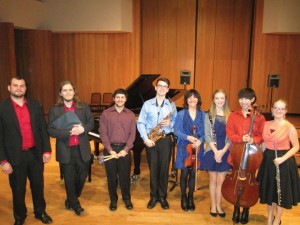Tatevik Hovhannisyan
Staff Writer

Remembrance commemorations take many forms. The Armenian Genocide is often commemorated by Church ceremonies, marches and demonstrations, and public talks. This year, as the centenary of the Genocide is marked, one of the unique commemorative programs was a performance by the Fresno State New Music Ensemble, a student-run chamber group that organizes performances dedicated to the promotion of music by living composers.
The New Music Ensemble kicked off their Spring series on Monday, March 9, in the campus Concert Hall with a program dedicated to living Armenian composers. The students performed compositions by Tigran Mansurian, Charles Amirkhanian, Anna Aidinian, Artur Avanesov, Steven Aprahamian, Eve Beglarian, and an original piece, “In the Shadow of Ararat,” created by New Music Ensemble Founder Joseph Bohigian.
“There had been talk of forming a group that focuses exclusively on the music of living composers, so I talked to a few friends who I thought would be interested and we decided to put the group together,” stated Bohigian, a senior music major.
The program opened with Tigran Mansurian’s Five Bagatelles, a piece for piano, violin and cello, with its moderate melody. This composition, one of the works of the popular contemporary Armenian composer, transported the attendees to another world, the world of the vibrant and dynamic Armenian people.
Charles Amirkhanian’s electronic piece “Dzarin Bes Ge Khorim” (I am Thinking Like a Tree) elicited a unique response from the audience. Amirkhanian’s collage of repetitious elementary Armenian phrases such as “eench ga chiga, pan me chiga” left the audience in an upbeat and positive mood, as they laughed and enjoyed the sounds so familiar to the Armenian language.
The program consisted of modern and contemporary works with vibrant and unexpected sounds, yet in every composition, there was an Armenian influence. “I wanted to display for the audience the wide range of music that is being created today by Armenian composers,” said Bohigian.
“The Program was quite unusual, because I was expecting to hear more of the classical music. It was more modern and you could tell that the performers were enjoying the works. The professionalism made the compositions sound more interesting to listen to,” said audience member Yelena Hovhannisyan.
The closing performance of the Concert was the world premiere of “In the Shadow of Ararat,” written by Bohigian. “’In the Shadow of Ararat’ is my piece commemorating the 100th anniversary of the Genocide, but I sought to write it from my perspective, that is, a descendent of survivors who is separated by a century from the events themselves,” said Bohigian. “I wouldn’t say the piece is about the Genocide itself, but is rather my interpretation of all my experiences hearing stories about it and all the emotions involved with the Genocide.”
The young composer took inspiration from traditional Armenian folk and sacred music in creating “In the Shadow of Ararat,” where he explores the scar the Genocide has left on generations of Armenians as well as a sense of distance from the events of 1915, which still have a major influence on Armenians today.
“I hope that the audience left reflecting on the great things that Armenians have accomplished in the past 100 years,” said Bohigian. The purpose of the concert was to commemorate but also demonstrate how Armenian artists continue to thrive and contribute greatly to their respective fields.
 Hye Sharzhoom Armenian Action
Hye Sharzhoom Armenian Action